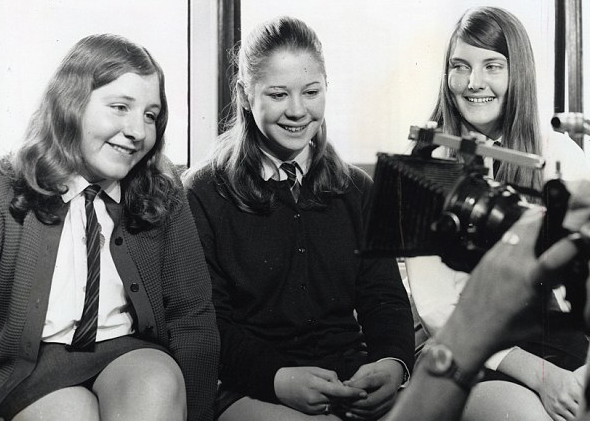 Television is full of shows where young people share their hopes and dreams.
Television is full of shows where young people share their hopes and dreams.
But there’s only one series that has seriously been tracking a group of children first interviewed in the 1960s about how their lives have turned out. Thus the filmmaker Michael Apted turned footage from a TV interview about children from different British classes into a seven year gut check, for the subjects and for us.
The latest, “56 Up,” making its bow tonight on “POV” (PBS, 10 p.m., check local listings) and look how old everyone is (viewers included).
By now, the director can cut in between what a child said at seven, to his sullen responses at 14 to the reality of life as a young person at 21. Of course, the subjects of the film are affected by the filming itself — they practically became stars in England. Some of them dropped out of the project altogether, some are returning after a decades long absense.
There is a general acceptance or at least less of a cloud over unrealized dreams as the thoughtful subjects approach retirement. Or maybe the approach of the filmmaker is less harsh as well. But this is phenomenal documentary filmmaking and another series like this will never likely be made again.
I asked the filmmaker whether his view toward the subjects had mellowed over the year, when he appeared as part of the TV Critics Association summer press tour in August.
Apted agreed there had been a change in his approach, “but I think it’s sort of organic.”
“I suppose the most important thing is the age difference diminishes,” he said. “You know, I’m 15 years older than them. And when they’re younger, that’s a huge difference. But now, when they’re in their 50s and I’m 15 years older than them, it seems to come closer together. And I think we’re more collegial. We’re more intimate. I think we’re franker. I think they’re savvy to an extent about what goes on, so they can handle themselves better. I can afford to push them a little bit.
Apted said he had to learn, over time, “not to guide them, not to anticipate, not to have an idea what ’56 Up’ is going to be about. Because I think when I sort of look at all the films together, they’re all different in many ways. The tone is different. And I began to get the sense that if I was kind of predicting what would happen or getting ahead of myself, if I was just kind of doing a follow up each generation, then I would just make it a sort of self fulfilling prophecy.
“For example, on this film, I thought this film would be depressing. When I set about to make it, I thought people would be very concerned, you know, with mortality and whatever and stuff like that. But it turned out sort of differently in a way that was completely unexpected to me.”
So it was important, he said, to try and approach film with as much of a blank slate as possible to ask “Who are they now? What are they up to now? Rather than, ‘You said this last time: what do you think about this this time?'”
That approach, he says, “allows the films to kind of breathe a bit and maybe find sort of different ground to kind of make fertile, as it were.”
This time, he said, “I felt that the participants who’d invested energy and time and family life, in fact, seemed to have a more solid ground to themselves to deal with the rigors of living in the United Kingdom in 2012 .. as well as others who maybe had chosen more career and ambition and things like that. So I found that very rewarding: that the investment in family had paid off, and I had no idea that that was going to come out.”
And that itself, he added “brought a kind of optimism to the film in a sense. It kind of something unexpected to it that I really didn’t think would ever be there. And what was so odd for me is that I never realized it while I was shooting it. I sort of never realized it when I was putting it together. I only realized it when I showed it to an audience for the first time. And I could see that it was a much warmer film than I thought it could possibly have been. So it’s a very strange and organic process, this film.”